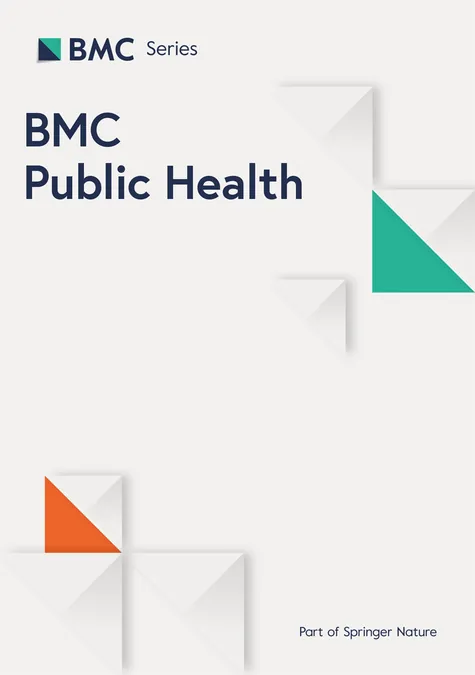
Unlocking the Mystery of Dizziness and Imbalance: A Deep Dive into Health Implications for Middle-Aged Adults
2025-04-05
Author: Sarah
Unlocking the Mystery of Dizziness and Imbalance: A Deep Dive into Health Implications for Middle-Aged Adults
Dizziness, imbalance, and vertigo are not just fleeting sensations; they are prevalent concerns affecting millions, often significantly impacting daily activities. In fact, dizziness and/or vertigo rank among the top three reasons individuals visit general outpatient clinics, accounting for 2.5% of all emergency healthcare visits. This serious health issue often leads to a cascade of problems, including increased risk of falls and decreased overall quality of life. Understanding the factors contributing to these symptoms is crucial, particularly as the population ages.
Recent studies indicate that dizziness can stem from a myriad of causes, including medication effects (polypharmacy), neurological disorders, and psychological conditions. Unfortunately, healthcare professionals find it challenging to pinpoint a direct link between patients' symptoms and underlying conditions. This confusion can hinder proper diagnosis and treatment.
Middle Age: A Critical Period for Health Monitoring
While extensive research focuses on individuals aged 65 and older—who often experience multi-morbidities—there’s a gap in understanding dizziness and imbalance prevalence among middle-aged adults (ages 45 to 70). To fill this void, the Busselton Healthy Ageing Study (BHAS) sought to investigate this issue within an Australian community.
Participants in this study included 5,086 individuals from Busselton, Western Australia. They underwent comprehensive assessments, providing valuable data on dizziness and its implications on general and mental health. Alarmingly, about 23.9% reported experiencing dizziness or imbalance, with over two-thirds identifying sensations of light-headedness as their primary symptom.
The impact of these symptoms varies: while many participants noted they rarely affected daily life, approximately 5% felt a constant impairment. The study outlined how dizziness is associated with several demographic and health-related factors, including gender, age, and mental health status.
Key Findings: Who Is Most Affected?
The study revealed important trends: 1. **Demographics**: Females and older adults (aged over 58) were significantly more likely to report dizziness. 2. **Health Conditions**: Those with a history of diabetes, hypertension, heart disease, or neurological issues reported higher instances of dizziness. 3. **Mental Health**: Not surprisingly, participants with depression were more likely to experience dizziness—showing a clear link between mental and physical health.
Notably, the correlation between dizziness and conditions like Migraine and Meniere’s disease indicates that underlying ear disorders can amplify these sensations, suggesting a possible direction for medical intervention.
The Burden on Health Care Systems
Dizziness not only diminishes quality of life for individuals; it also places immense pressure on health care resources. The mean annual healthcare costs linked to dizziness in the U.S. is astonishing, exceeding $2,600 per patient, highlighting the need for improved diagnostic and treatment strategies.
Moreover, the societal implications are profound. Dizziness can lead to avoidance of activities, reduced social interactions, and an overall decline in mental wellbeing. With the prevalence of dizziness soaring, health care providers particularly need to focus on prevention strategies and education about falls risk reduction.
Moving Forward: A Call for Comprehensive Research
The findings of the Busselton Healthy Ageing Study underscore the need for more extensive research into the causes and consequences of dizziness among middle-aged populations. Future studies should not only broaden demographic segments but also refine diagnostic criteria to distinguish between dizziness types more effectively.
As our healthcare systems brace for a surge in older populations, addressing dizziness and its alarming associations could effectively mitigate a range of health issues before they become debilitating. The time to act is now—an ever-aging population requires urgent action and insight into understanding and treating dizziness.
In summary, while dizziness may seem a minor inconvenience, it is a significant public health concern with wide-ranging implications. A proactive approach in health monitoring, education, and providing timely interventions for dizziness can enhance the quality of life for countless middle-aged adults, paving the way for healthier aging in our communities.



 Brasil (PT)
Brasil (PT)
 Canada (EN)
Canada (EN)
 Chile (ES)
Chile (ES)
 Česko (CS)
Česko (CS)
 대한민국 (KO)
대한민국 (KO)
 España (ES)
España (ES)
 France (FR)
France (FR)
 Hong Kong (EN)
Hong Kong (EN)
 Italia (IT)
Italia (IT)
 日本 (JA)
日本 (JA)
 Magyarország (HU)
Magyarország (HU)
 Norge (NO)
Norge (NO)
 Polska (PL)
Polska (PL)
 Schweiz (DE)
Schweiz (DE)
 Singapore (EN)
Singapore (EN)
 Sverige (SV)
Sverige (SV)
 Suomi (FI)
Suomi (FI)
 Türkiye (TR)
Türkiye (TR)
 الإمارات العربية المتحدة (AR)
الإمارات العربية المتحدة (AR)